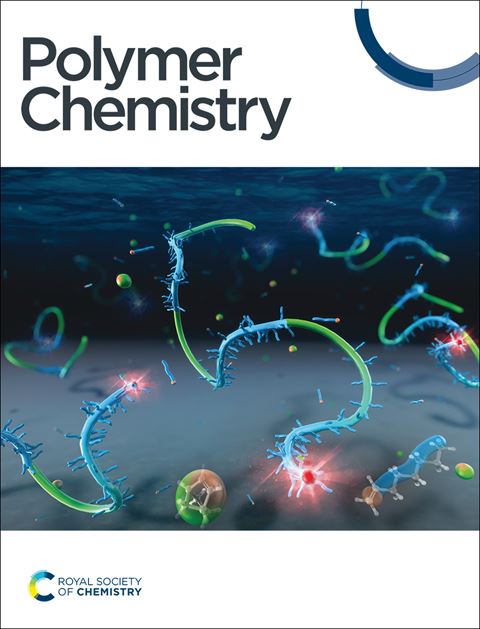热响应性乳酸酰胺丙烯酸聚合物从PLA袋
IF 4.1
2区 化学
Q2 POLYMER SCIENCE
引用次数: 0
摘要
受化石资源枯竭和日益严重的环境问题的驱动,全球对可持续产品的需求不断增长,扩大了将木质纤维素生物质转化为生物基溶剂、精细化学品和聚合物的兴趣。其中,乳酸已成为合成高价值衍生物的关键平台化学品。聚乳酸(PLA)的化学解聚成乳酸酯和酰胺代表了一个简单而有效的策略,将PLA废物升级为特种聚合物。在这项研究中,我们开发了一个乳酸酰胺基丙烯酸单体的小型文库,使用市售的PLA袋作为原料。这些单体在紫外光下通过Cu(II)Br2/ me6trenn介导聚合聚合成同源共聚物、统计共聚物和嵌段共聚物。所得到的聚合物具有可通过酰胺n取代调节的水溶性和低生态毒性。这种创新的方法不仅推进了可持续的聚乳酸废物管理,而且为设计具有单相或双相分离行为的高级热敏聚合物开辟了新的可能性——这是生物基合成聚合物研究中尚未开发的前沿领域。本文章由计算机程序翻译,如有差异,请以英文原文为准。

Thermoresponsive lactate amide acrylic polymers developed from PLA bags†
The growing global demand for sustainable products, driven by the depletion of fossil resources and mounting environmental concerns, has amplified interest in transforming lignocellulosic biomass into bio-based solvents, fine chemicals, and polymers. Among these, lactic acid has emerged as a pivotal platform chemical for synthesizing high-value derivatives. The chemical depolymerization of polylactic acid (PLA) into lactate esters and amides represents a straightforward and efficient strategy for upcycling PLA waste into specialty polymers. In this study, we developed a mini-library of lactate amide-based acrylic monomers using commercially available PLA bags as feedstock. These monomers were polymerized into homo, statistical, and block copolymers via Cu(ii)Br2/Me6TREN-mediated polymerization under UV light. The resulting polymers exhibited water solubility adjustable through amide N-substitution combined with low ecotoxicity. This innovative approach not only advances sustainable PLA waste management but also opens new possibilities for designing advanced thermoresponsive polymers with single or double phase separation behaviors—an underexplored frontier in biobased synthetic polymer research.
求助全文
通过发布文献求助,成功后即可免费获取论文全文。
去求助
来源期刊

Polymer Chemistry
POLYMER SCIENCE-
CiteScore
8.60
自引率
8.70%
发文量
535
审稿时长
1.7 months
期刊介绍:
Polymer Chemistry welcomes submissions in all areas of polymer science that have a strong focus on macromolecular chemistry. Manuscripts may cover a broad range of fields, yet no direct application focus is required.
 求助内容:
求助内容: 应助结果提醒方式:
应助结果提醒方式:


